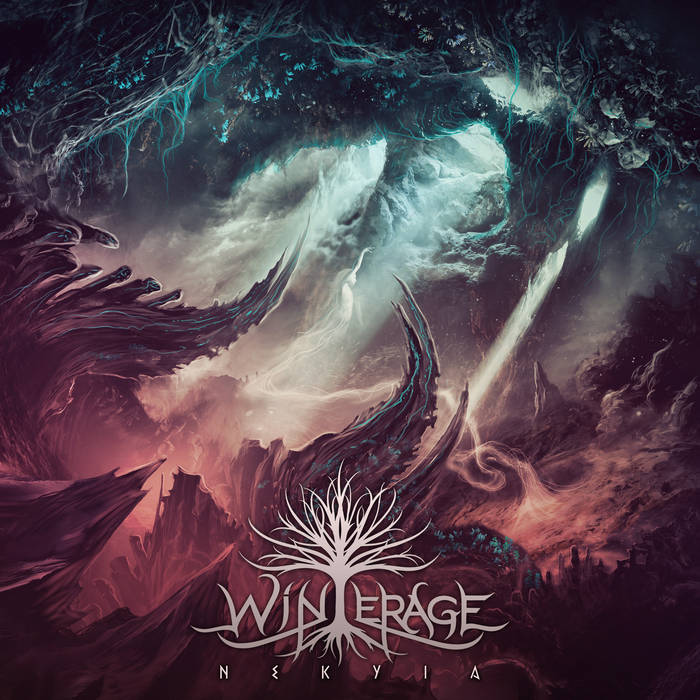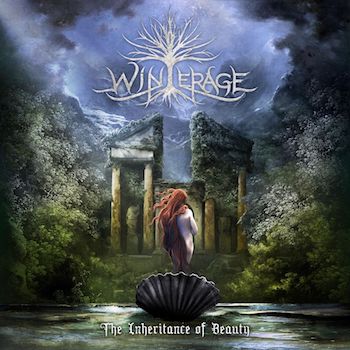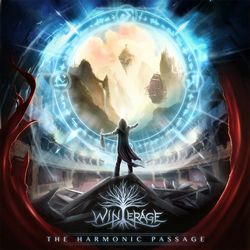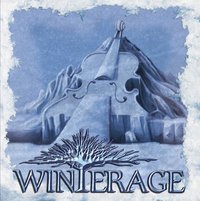Winterage - Interview
Italian Winterage have recently released their third full-length album "Nekyia" which became surprisingly much gloomier and darker than its predecessors. Also the classic influences were driven back and instead of this the band used some more cinematic elements. I had a very interesting chat with their major songwriter / violin player Gabriele Boschi where he explained a lot about this different approach of songwriting and his vision of music.
Enjoy reading and "Nekyia"!
Michael
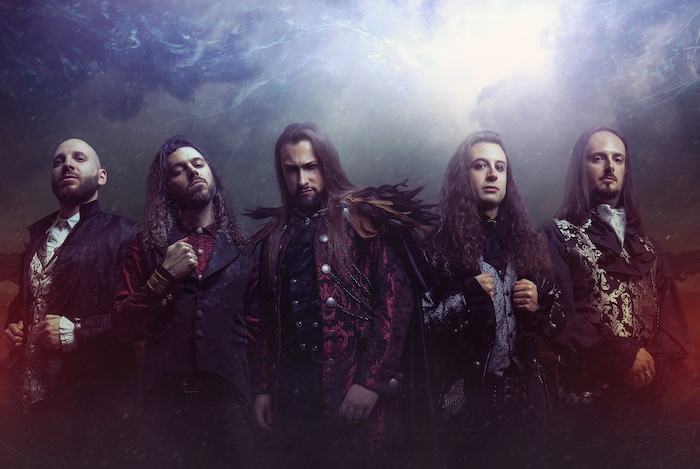
Hi Gabriele, how are you doing?
I'm fine and the band is fine. We're at the end of our summer concerts where we played in Italy for the last months and in England.
With your third album you have a quite more heavy approach than on the predecessors and also the cover is much darker than before. Why did you choose to go this way?
Everything started with the main concept of the album. We are not used to creating concept albums but maybe Nekiya is closer to a concept album than the other albums were. We have a main theme which is the descending. The darker sound and the darker images, also in our videos and photo shootings, are because of the thematic. We decided to enrich the orchestral stuff but also the metal influence. Our previous albums were symphonic metal where you sometimes had to choose which side to emphasize - metal stuff or orchestral parts. It's not so easy to put these two aspects and mix them together. We grew up a lot and with this album I guess both parts are dealing together much better. We had the space to emphasize both parts, especially the metal influence, following the thematic of the album. Even the orchestral stuff is much heavier and more bombastic. The dark tones of the album are because of its topic and we wanted to create a world around these themes we followed from the images, the cover artwork and from the music.
The title "Nekyia" originated in Greek mythology and it means like you said "to descend". What is the idea behind it?
The Nekyia is an ancient Greek ritual where the person who spells these rites descends into the underworld to speak with the spirits and to get advice for the future and more knowledge from them. We took this idea of descending and used it to express the idea of descending also into ourselves, to the inner depths of our spirit. I discovered that also Karl Gustav Jung, the philosopher and psychologist, took this ritual with this idea of descending into yourself to get to know better the unconscious and the visions he had. We wanted to do the same. The main idea of the album is the descend. We wanted to descend into ourselves to get to know better our feelings, all the emotions that a human being could feel, the good and the bad ones. On The Inheritance Of Beauty, our previous album, the main topic was to discover the beauty which is hidden inside the human being. Now we wanted to focus on the totality of the emotions in the human beings, knowing and accepting them so that you will be able to overpass it and to cope with sadness and other negative emotions. The main theme of the album is about that and all the songs are connected to the main concept.
When I have a look at the song titles, I don't get any connection between Simurgh which is a fable animal in Persian mythology and Hecate who originated in Greek mythology. Is there some connection between all the songs except that they deal with ancient mythologies?
We love to tell different stories and we like to take different spots to make the songs different from each other. We decided to connect all the songs to the main concept, using different stories from different times. As you said, Simurgh is an ancient Persian story where a swarm of birds are looking for their god. They start to travel, following among seven valleys while each of the valleys represents a part of human spirit. They have to pass all these valleys and at the end of the journey they see a giant shadow representing a giant bird but suddenly they discover that this shadow is made by them. The main topic of the song is that you are the leader of yourself if you know yourself. A song like 'The Cult Of Hecate' is more related to the Greek word "Nekyia" because the goddess Hecate was traveling between the surface and the underworld to bring people there. 'Dark Enchantment' is related to an Italian philosopher Piero Ferrucci, who wrote a book called "The New Will". There he said that when you are feeling down and go through some really bad moments, all the reality becomes dark and it's like a spell is cast upon you. I particularly love this song because in the middle there is this ritual with some choirs which is like being in a temple where the crowd is casting this spell. 'La Fonte D'Essenza' which is in Italian is a very abstract song (laughs). The title means fountain of the essence. From that fountain water comes from and this water represents the totality of the emotions of human beings. These emotions stayed the same since the beginning of mankind; we just changed the way how we feel them and the variation in our reality. But love and hate are the same feelings the ancient Greek, Romans or whoever had and we have now. In this fountain you can have a bath and so you can get to know yourself better. This is related to the last song on the album, 'Resurrectio Ad Mundum', which means resurrection on earth - there you will be reborn as a human being because you know yourself better.
In the past you had much more classic influences than you have on "Nekyia". Was this planned right from the beginning?
I don't know if this is correct. Maybe this album is more cinematic than classic. We decided to put out symphonic influences more into cinematic stuff. Actually in one of our last songs, 'Metamorphosis, A Macabre Ritual', a song which is divided into two parts, the second part is totally taken by the "Danse Macabre" by Camille Saint-Saens who was a classical French composer at the end of the 19th century. We arranged it in a metal way. So I guess in Nekiya there are even more classical parts than on the previous album because there we took only small parts into the songs. For example in 'The Amazing Toymaker' we used "The Nutcracker" by Tschaikovsky or in The Harmonic Passage in the song 'Awakening' we used "Swan Lake" by him.
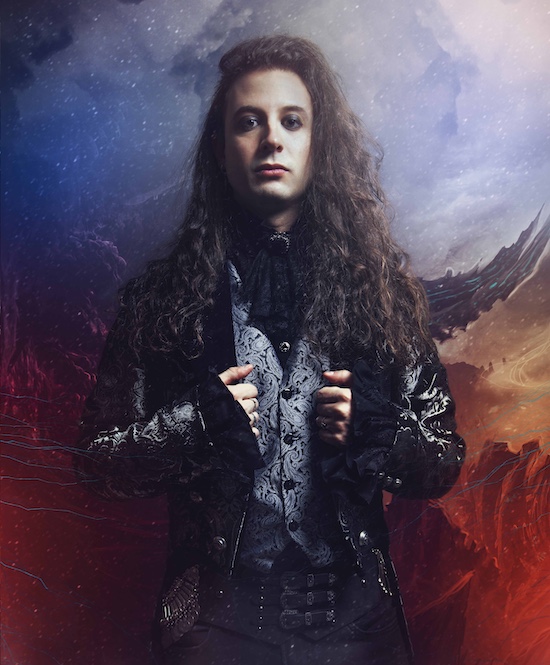
So what would you say for which movie could be your music the perfect soundtrack for?
Well, I became a film composer a few years ago and I am influenced by "Lord Of The Rings" and all the John Williams stuff in "Star Wars", "Jurassic Park" and "Harry Potter" but I also love newer soundtracks like "Dungeons And Dragons", "Dune" or "Interstellar". In my vision we play metal but my musical vision is to create a giant ensemble where the band is just included in the orchestra.
Did you have a classical musical education so that you are able to write such impressive arrangements?
Yes, I play the violin and almost everybody in my family is a classical musician. My father plays in an orchestra and I grew up in classical music. Actually I started my first lesson at the age of 2 (laughs) where I played a viola instead of a cello because there aren't such small cellos. I started my classical studies with the violin at the age of 8 and I graduated from that at the conservatory around 20 years ago. I also played in many orchestras. That was great for my skills to write and compose for the orchestra. If you just study and you just can play all the instruments it is one thing but if you spend hours and hours in lessons and concerts with different repertoires from classic to soundtracks to even pop music, you can feel and absorb the music. I always had an extremely active listening in the rehearsals and you get to know how to work with the instruments to make them sound perfect and also the intention of the composer. So you become able to reproduce it.
I remember that you put some Easter Eggs on the last album the fans had to find. Is this also the case here?
Yes, these Easter Eggs are just from classical composers. As I said, we took "Danse Macabre" in 'Metamorphosis, A Macabre Ritual' but there is also another one which is hidden and I guess nobody ever noticed it. It is in the first track 'Apertio Ad Profundum' – there's a little quotation of "Dies Irae" by Mozart and it's in the brass section.
When I remember some old Manowar interviews, it always comes to my mind that Joey DeMaio stated that Richard Wagner was the first person who played heavy metal. Would you agree that some classical music has many similarities to heavy metal?
Surely he was right but in my opinion he wasn't the first. You can also feel rock and metal in Vivaldi, for example "The Storm". Another early rock star was Niccolò Paganini as violinist because he was the very first who put himself on stage with other people accompanying him. And he was a virtuoso of his instruments who made variations and improvisations of his songs. I think that classical music and heavy metal are extremely connected by rhythmic, harmony and melodies. They can fit together very well.
And what are the biggest metal influences on you? Were you inspired by Ghost a little bit – listening to "Dark Enchantment" I somehow get reminded of "Spirit" not only because you are singing "Spirit Of Darkness" but also because of the melody there….
Well, not really by coincidence. I don't know this song but I will listen to it, you made me curious. Our main influences are Rhapsody Of Fire, we grew up with their songs and with their use of harmonies and combining orchestra and metal. They forged our way. I am also extremely inspired by Nightwish, Sonata Arctica, Symphony X and also Dimmu Borgir.
The last words belong to you!
Thank you so much for this interview, Michael! I also want to thank all the people who will read the interview and who are curious to listen to our music. Please get into the depths of our lyrics because everything is going to be more superficial but if you dive deeper into the topic you can emerge yourself into a new universe.
Discography
Upcoming Releases
- Morrath - Obscure Abominations - Feb 25
- Chalice - Divine Spear - Feb 27
- Blackwater Drowning - Obscure Sorrows - Feb 27
- Vide - Aux Enfants Des Ruines - Feb 27
- The Leaving - The Leaving - Mar 06
- Serpent Icon - Tombstone Stories - Mar 06
- Insect Inside - Reborn In Blight - Mar 06
- Triumpher - Piercing The Heart Of The World - Mar 06
- Lömsk - Act II - Of Iron And Blood - Mar 06
- God Against Humanity - The Judgement - Mar 06
- Monstrosity - Screams From Beneath The Surface - Mar 13
- Against I - Anti Life - Mar 13
- Empire Of Disease - While Everything Collapses - Mar 19
- Hanging Garden - Isle Of Bliss - Mar 20
- Putred - Blestemul Din Adânc - Mar 20
- Gaerea - Loss - Mar 20
- Diatribes - Degenerate - Mar 20
- Zerre - Rotting On A Golden Throne - Mar 27
- Foetorem - Incongruous Forms Of Evergrowing Rot - Mar 27
- Cryptworm - Infectious Pathological Waste - Mar 27

